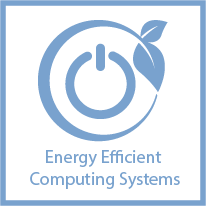Energy Efficient Computing Systems
Energy Efficient Computing Systems (EECS)

Energy efficiency is the key design challenge for future computing systems, ranging from wireless embedded client devices to high-performance computing centers. The Energy Efficient Computing Systems (EECS) research initiative was established in 2012 to respond to the challenges met in the current socio-economic context.
The EECS Group's primary research efforts focus on improving the energy efficiency of computing systems across all abstraction layers — spanning disciplines such as nanoscale electronics & materials, computer architecture, system software, and applications.
EECS is also acting as an EU Digital Innovation Hub (DIH) with the goal of providing knowledge on energy efficient computing for the Norwegian industry.
Strategic Research Area
EECS is a joint initiative by the Department of Electronic Systems, the Department of Computer Science, and the Department of Information Security and Communication Technology.
This strategic research area is hosted by the Faculty of Information Technology and Electrical Engineering.
Organized Events
- Workshop on Sustainable and Performant Computing, 2024
- Workshop on Energy Efficiency for the Internet of Things and Beyond, 2024
- Technology transfer webinar, 2020
- Neurons and nano systems: The next Computer? at The Big Challenge, 2019
- Quantized Neural Networks with Xilinx PYNQ, 2017
- Energy Efficiency Seminar, 2017
- Nordic Workshop on Multi-Core Computing (MCC), 2016
- Parallel Processing for Energy Efficiency (PP4EE), 2013
Internal
EU H2020/FP7
- Towards Employing Compilers for Thermal Management and Optimal Data Placement in Hybrid Caches, H2020 MSCA-IF, 2021-2022.
- Harnessing the Emergent Properties of Nanomagnet Ensembles for Massively Parallel Data Analysis, (SpinENGINE), H2020 FET-Open, 2020-2024.
- Boosting Widening Digital Innovation Hubs (BOWI), H2020 DT-ICT-01-2019, 2020-2023
- Non-Intrusive Power Monitor for Low-Energy Computing Systems (NIPOLECS), TETRAMAX, 2019.
- Low Power and Fault Tolerant Cache Memory Design through a Combination of Hardware and Software Approaches (PALMERA), H2020 MSCA-IF, 2018-2019.
- Towards Ubiquitous Low-power Image Processing Platforms (TULIPP), H2020 LEIT-ICT, 2016-2019.
- Energy-Efficient High-performance Exascale Computing (READEX), H2020 FET-HPC, 2015-2018.
- Nanoscale Engineering for Novel Computing Using Evolution (NASCENCE), FP7, 2012-2015.
NFR
- SPrINTER: Spin-based Intermittent Computer, 2022-2026
- TailorMade: Tailoring Server Processors to Application Characteristics for Sustainable Warehouse-Scale Computing, Young Research Talents, 2020-2024.
- Balancing Compute and Memory Accelerators with Analytical Modeling (BAMPAM), Young Research Talents, 2019-2023.
- SOCRATES: Self-Organizing Computational Substrates, IKTPLUSS, 2017-2022.
NTNU


















